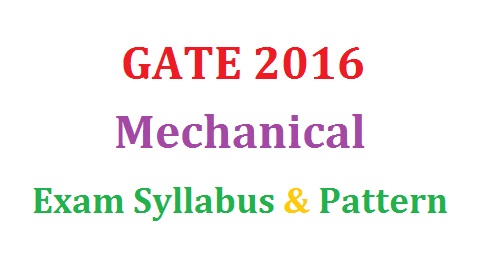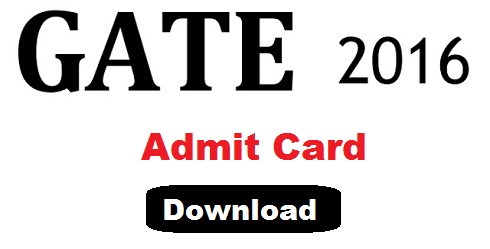The Graduate Aptitude Test in Engineering (GATE) is a pan-India examination that aims to test the candidates comprehensive understanding of various engineering undergraduate subjects. GATE is conducted in collaboration with the IISc, Bangalore and seven IITs (Bombay, Delhi, Kanpur, Guwahati, Kharagpur, Chennai and Roorkee).
The GATE score, reflecting the relative scoring of the candidates is used for admissions to various post-graduate programs like Masters in Engineering, M.tech and Ph.D. The GATE score is also used by various public sector undertakings (PSUs) for recruiting engineers at the graduate level into various entry level openings.
Also Check:
- GATE 2016 Marking Scheme
- GATE 2016 Cut Off Marks
- GATE 2016 Preparation Tips
- GATE Reference Books 2016

GATE ME: Candidate with a bachelor’s degree in Mechanical Engineering or in the final year of engineering pursuing Mechanical engineering are eligible to apply for GATE 2016. To help with the preparation the GATE 2016 ME exam syllabus and exam pattern is enumerated.
GATE 2016 ME Exam Syllabus:
The GATE 2016 ME exam syllabus is as follows. It is divided into: branch specific subjects, engineering mathematics and general aptitude. The GATE 2016 exam syllabus as released by the organizing institute is summarized below:
Engineering Mathematics:
Complex variables: Analytic functions, Cauchy’s integral theorem and integral formula, Taylor’s and Laurent’ series, Residue theorem, solution integrals.
Linear Algebra: Matrices, linear equations, Eigen vectors.
Numerical Methods: single and multi-step methods for differential equations, Fourier transform, Laplace transform, Z-transform.
Differential equations: First order equation, Higher order linear differential equations with constant coefficients, Method of variation of parameters, Cauchy’s and Euler’s equations, Initial and boundary value problems, Partial Differential Equations and variable separable method.
Probability and Statistics: Sampling theorems, Conditional probability, Mean, median, mode and standard deviation, Random variables, Discrete and continuous distributions, Poisson, Normal and Binomial distribution, Correlation and regression analysis.
Calculus: Mean value theorems, Theorems of integral calculus, Evaluation of definite and improper integrals, Partial Derivatives, Maxima and minima, multiple integrals, Fourier series. Vector identities, Directional derivatives, Line, Surface and Volume integrals, Stokes, Gauss and Green’s theorems.
Applied Mechanics and design:
Engineering Mechanics: Free body diagrams and equilibrium; trusses and frames; virtual work; kinematics and dynamics of particles and of rigid bodies in plane motion, including impulse and momentum (linear and angular) and energy formulations; impact.
Vibrations: Free and forced vibration of single degree of freedom systems; effect of damping; vibration isolation; resonance, critical speeds of shafts.
Design: Design for static and dynamic loading; failure theories; fatigue strength and the S-N diagram; principles of the design of machine elements such as bolted, riveted and welded joints, shafts, spur gears, rolling and sliding contact bearings, brakes and clutches.
Production Planning and Control: Forecasting models, aggregate production planning, scheduling, materials requirement planning.
Forming, Joining, Machining, Metal Casting, Thermodynamics, Heat Transfer, Fluid Mechanics, Theory Of Machines, Strength Of materials, Engineering materials.
Metrology and Inspection: Limits, fits and tolerances; linear and angular measurements; comparators; gauge design; interferometry; form and finish measurement; alignment and testing methods; tolerance analysis.
Computer Integrated Manufacturing: Basic concepts of CAD/CAM and their integration tools.
Inventory Control: Deterministic and probabilistic models; safety stock inventory control systems.
Operations Research: Linear programming, simplex and duplex method, transportation, assignment, network flow models, simple queuing models, PERT and CPM.
General Aptitude:
Verbal ability: English grammar, verbal analogies, word groups, sentence completion, instructions, critical reasoning and verbal deductions.
Now, that we are done with the GATE ME exam syllabus, lets move towards the exam pattern and important dates for GATE exam 2016.
GATE 2016 ME exam pattern: The GATE exam, across disciplines is an online paper of a single session of 3 hours duration. The paper consists of 65 questions spanning 100 marks. The layout of the GATE 2016 exam is:
Sectional weightage:
| Weightage | Questions | |
| Mechanical Engineering(Branch related questions from topics detailed) | 70 Marks | 25: 1 marks question & 30: 2 marks question |
| Engineering Maths | 15 marks | |
| General Aptitude | 15 marks | Five 1 marks question and five 2 marks question |
In the GATE ME exam 70% of the maximum marks is given to the Branch specific questions detailed in the syllabus above. 15% is reserved for the engineering maths section and 15% for the General Aptitude.
Negative marking: For a 1 mark question, 1/3 marks will be deducted for every wrong answer and for every 2 marks question 2/3 marks will be deducted for every wrong answer. However, no negative marking for integer answer type questions.
Question types: The GATE 2016 ME exam is proposed to have the following question types:
- Multiple choice question(MCQs): They may carry 1 or 2 marks in all the sections. These questions are objective in nature and the answer is to be chosen from among four options listed.
- Numerical answer questions: the numerical answer or fill in the blank type of questions carry 1 or 2 marks in all sections. Here choices are not given. The answer has to be entered through a virtual keypad. The fill in the blanks type of questions generally comprise 35-40% of the paper.
Online pattern: as GATE 2015, GATE 2016 ME exam is to be conducted on the online pattern. The paper is carried out online Computer Based Test at designated centers. The answers have to marked in the radio dialogue box using the mouse or entered through a virtual keyboard. An online calculator is provided which is on-screen.
GATE Mechanical exam schedule 2016: The GATE mechanical exam form will be released in the first week of September, 2015 and registrations close by the first week of October. The exam date is yet to be announced and is expected to fall between 30th January 2016 and 7th February 2016.
The Indian Institute of Science, Bangalore is the organizing institute of GATE 2016.
















































